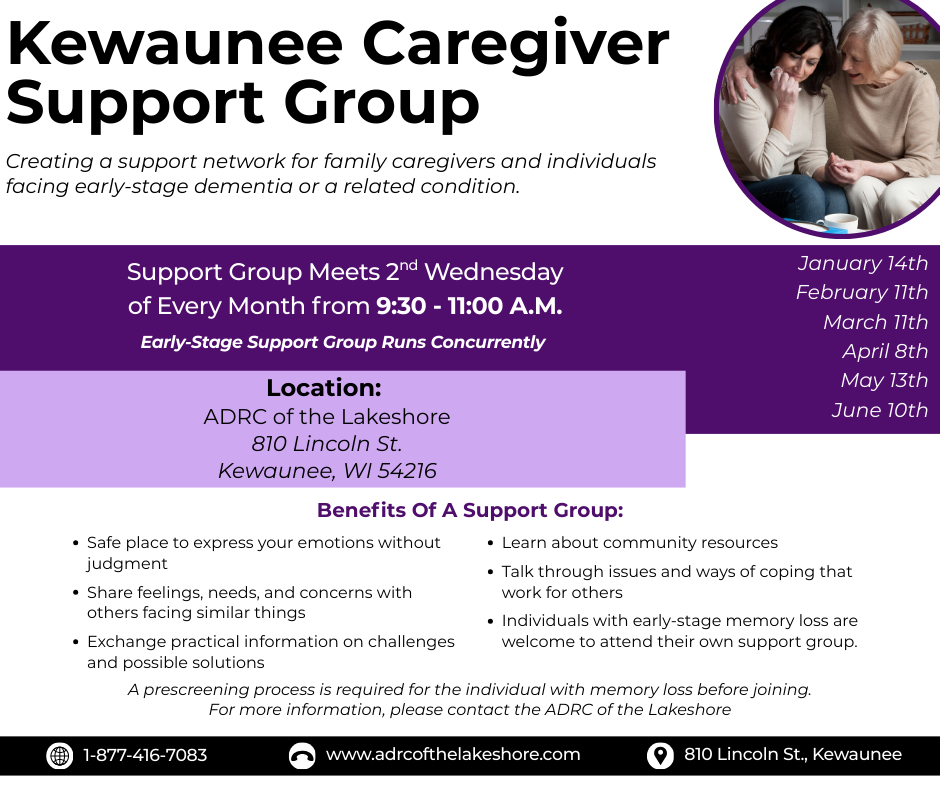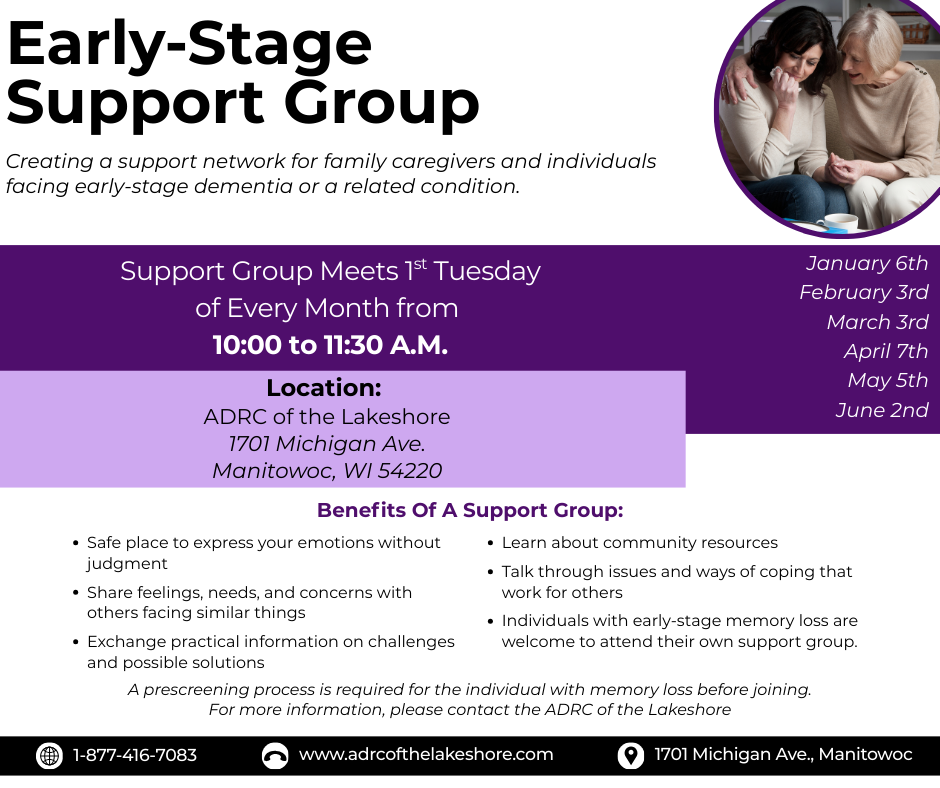Caregiver Support

You are a caregiver if you are a spouse, adult child, other relative or friend who helps, cares for, or is concerned about an older adult or disabled person. Because of caregiving duties, you may feel stressed, frustrated, guilty or concerned about how you are going to handle future caregiving needs. The ADRC of the Lakeshore offers professional, unbiased information about support services and options that can help you—the caregiver—and the person you are caring for.
Caregiver Support Groups
These groups provide a great opportunity for caregivers and family members to share and learn from others experiencing similar frustrations and concerns. Occasionally, speakers are brought in to provide valuable information and resources.
Kewaunee County Caregiver Support Groups:
-
- Caregiver Support Group:
This is an opportunity for all family caregivers to meet other caregivers, share their experiences, and gain support in providing care for their loved ones. Each meeting will host simultaneous support groups for individuals affected by dementia and/or memory loss in the early stage, and one for family caregivers. (Assessment necessary prior to first session. Please call 1-877-416-7083 to schedule assessment.)
Location: Aging and Disability Resource Center of the Lakeshore
810 Lincoln Street, Kewaunee, WI 54216
Meets the 2nd Wednesday of each month from 9:30-11:00 a.m.
- Caregiver Support Group:
Manitowoc County Caregiver Support Groups:
-
- Early-Stage Support Group:
Each meeting will host two groups simultaneously in separate meeting rooms: one group for individuals affected by dementia and/or memory loss (early stage), and one for the family caregivers of individuals affected by dementia. (Assessment necessary prior to first session. Please call 1-877-416-7083 to schedule assessment.)
Location: Aging and Disability Resource Center of the Lakeshore
1701 Michigan Avenue, Manitowoc, WI 54220
Meets the 1st Tuesday of each month from 10:00-11:30 a.m.
- Family Caregiver Support Group:
This is an opportunity for all caregivers to meet other caregivers, share their experiences, gain support in providing care for your loved ones.
Location: Aging and Disability Resource Center of the Lakeshore
1701 Michigan Avenue, Manitowoc, WI 54220
Meets the 3rd Thursday of each month from 2:00-3:30 p.m. - Male Caregiver Support Group (Male Caregivers Only):
This is an opportunity for all male caregivers to meet other male caregivers, share their experiences, gain support in providing care for your loved ones.
Location: Aging and Disability Resource Center of the Lakeshore
1701 Michigan Avenue, Manitowoc, WI 54220
Meets the 3rd Wednesday of each month from 9:00-10:30 a.m.
- Early-Stage Support Group:
Caregiver Outreach Presentations
We offer community presentations on the issues related to caregiving to raise awareness and educate the public about available resources. For more information call us at 1-877-416-7083 or send us an email by clicking on Contact Us. We will respond to all messages within one business day.
National Family Caregiver Support Program
The National Family Caregiver Support Program (NFCSP), established in 2000, provides grants to States and Territories, based on their share of the population aged 70 and over, to fund a range of supports that assist family and informal caregivers to care for their loved ones at home for as long as possible. Families are the major provider of long-term care, but research has shown that caregiving exacts a heavy emotional, physical, and financial toll. Many caregivers who work and provide care experience conflicts between these responsibilities. 22% percent of caregivers are assisting two individuals, while eight percent are caring for three or more. Almost half of all caregivers are over age 50, making them more vulnerable to a decline in their own health, and one-third describe their own health as fair to poor. The NFCSP offers a range of services to support family caregivers. Under this program, States shall provide five types of services:
- information to caregivers about available services,
- assistance to caregivers in gaining access to the services,
- individual counseling, organization of support groups, and caregiver training,
- respite care, and
- supplemental services, on a limited basis.
These services work in conjunction with other State and Community-Based Services to provide a coordinated set of supports. Studies have shown that these services can reduce caregiver depression, anxiety, and stress and enable them to provide care longer, thereby avoiding or delaying the need for costly institutional care.
Eligible Program Participants
While the Aging Network has always been involved with meeting the needs of both care recipients and family caregivers, by creating the National Family Caregiver Support Program, Congress explicitly recognized the important role that family caregivers occupy in our nation’s long-term services and supports system. As of the 2006 Reauthorization of the Older Americans Act, the following specific populations of family caregivers are eligible to receive services:
- Adult family members or other informal caregivers aged 18 and older providing care to individuals 60 years of age and older;
- Adult family members or other informal caregivers aged 18 and older providing care to individuals of any age with Alzheimer’s disease and related disorders;
- Grandparents and other relatives (not parents) 55 years of age and older providing care to children under the age of 18; and
- Grandparents and other relatives (not parents) 55 years of age and older providing care to adults aged 18-59 with disabilities.
Each family caregiver presents his or her own unique needs and preferences for the types of programs and services they wish to receive at any given point in time. Further, the programs and services that are available vary from state to state and community to community. Fortunately, a number of national organizations and programs exist to help inform and support program development and innovation. Please see resources and links below for additional information regarding research, technical assistance and support for program development.
Alzheimer’s Family & Caregiver Support Programs
The Alzheimer’s Family and Caregiver Support Program (AFCSP) is a program created by the Wisconsin legislature in 1985 in response to the stress and service needs of families caring at home for someone with irreversible dementia. To be eligible, a person must have a diagnosis of Alzheimer’s disease or a related disorder and be financially eligible.
- How does the AFCSP program work?
Funds for AFCSP are made available in each county to assist individuals to purchase services and goods related to the care of someone with Alzheimer’s disease. Funds may be available, depending on the county’s priorities and the person’s need for services. In some instances, the funds are used within the county to expand or develop new services related to Alzheimer’s disease, such as respite care, adult day care or support groups or services. Please note that there may be income restrictions, and it is best to contact the ADRC of the Lakeshore to determine eligibility. - What types of goods and services does the program purchase?
Allowable services are those which are necessary to maintain a person with Alzheimer’s disease in the community, typical services have included in-home help, respite care, adult day care, and transportation. Goods provided have included nutritional supplements, security systems, specialized clothing, incontinence products, home delivered meals, home adaption, specialized equipment. - Do I need a doctor’s statement?
Yes, the person must be diagnosed with Alzheimer’s disease or any of the other irreversible dementias. The AFCSP coordinator for the county must have a Medical Release of Information form (will be provided) signed by the applicant’s doctor. - Can I find out more about AFSCP?
Contact the Aging and Disability Resource Center of the Lakeshore: phone 920-683-4180 or Toll-Free, 1-877-416-7083.Limited financial assistance is available annually to individuals providing care to others. Call us for more information about this program and status of the funds.
Links:
